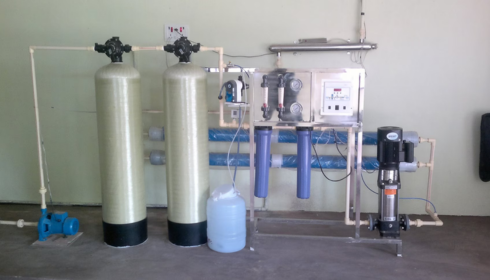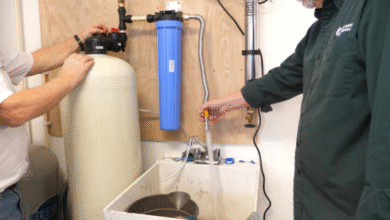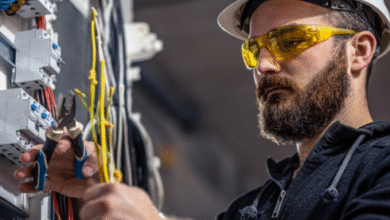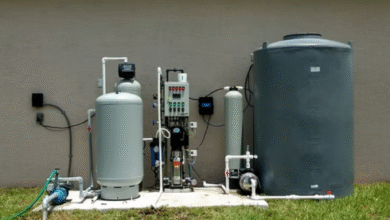Water You Can Trust: Why Treatment Solutions Are More Essential Than Ever

We turn on the tap dozens of times a day without thinking. Fill a kettle, rinse vegetables, pour a glass for the kids, maybe even top off the dog’s bowl. Water is just there—constant, invisible, dependable. Until one day it’s not. Maybe the taste seems off, or you notice stains on the sink that weren’t there before. Or maybe you read a headline about contaminants making their way into local supplies, and suddenly every glass feels like a question mark. Clean water is something we all assume we have, but behind that assumption sits an entire world of treatment systems, services, and decisions that most of us only think about when something goes wrong.
The Bigger Picture in Businesses
It’s not just homes that rely on water quality. Restaurants, schools, hospitals, hotels—every kind of business needs water it can trust. In fact, many industries can’t function properly without it. Think of a coffee shop: the taste of their espresso depends heavily on the water running through the machine. Or a manufacturing plant: impurities in water can corrode equipment, ruin batches, or slow production. That’s why so many companies invest in commercial water treatment solutions. They’re not just about safety; they’re about consistency, efficiency, and protecting bottom lines. For a business, clean water can literally make or break reputation and revenue.
When It Hits Close to Home
On the residential side, the story is more personal. Parents want to know their kids are drinking water that won’t cause long-term health problems. Homeowners want to protect their appliances from scale buildup or rust. Even pets, gardens, and laundry routines are touched by water quality in ways you might not notice until problems pile up. That’s why residential water treatment services have become more sought after than ever before. It’s less about fear, more about peace of mind. People want to trust what comes out of the tap without second-guessing every sip.
Small Annoyances That Point to Bigger Issues
The signs of water quality problems are often subtle. Soap that doesn’t lather properly. Glasses that come out of the dishwasher with spots no matter how much rinse aid you use. Clothes that fade or feel stiff after just a few washes. At first, these feel like little inconveniences. But they’re also red flags, hints that minerals or contaminants are sneaking in. Over time, those little annoyances can wear down pipes, shorten the lifespan of appliances, and even impact health. Water might be clear, but “clear” doesn’t always mean “clean.”
Why Filtration Systems Are a Game-Changer
Not all problems call for massive infrastructure changes. Sometimes, it’s about adding a targeted layer of protection between your water supply and your daily routine. That’s where water filtration systems for home come in. These aren’t just fancy gadgets—they’re practical tools designed to pull out the things you don’t want, whether that’s chlorine, iron, nitrates, or just the sediments that make everything taste a little off. With the right system, you stop relying on bottled water or endless cleaning hacks, and instead get clean, reliable water straight from the source.
Choosing What Fits Your Life
The challenge is that no two homes—or businesses—face the exact same issues. A family on a private well might need a system that handles iron or sulfur. A city household might be more focused on chlorine or lead. Businesses might need large-scale setups that can filter thousands of gallons a day without slowing operations. That’s why testing matters. Once you know what’s in your water, you can choose a system tailored to it. It’s not about buying the most expensive option—it’s about buying the right one.
The True Cost of Doing Nothing
It’s tempting to ignore water problems if they don’t seem urgent. After all, if no one’s getting sick, it must be fine, right? But the costs add up quietly. Appliances work harder and break sooner. Cleaning products multiply as you fight stubborn stains. Bottled water becomes a recurring expense, both for your wallet and the environment. And there’s the bigger, less tangible cost: the low-level stress of wondering if your water is really okay. Investing in treatment might feel like an upfront expense, but it often saves more money—and worry—over time.
Maintenance Isn’t the Headache You Think
One misconception about water systems is that they’re a hassle to maintain. People picture endless filter changes, complex machines, or expensive service calls. In reality, most systems today are remarkably simple. Many filters only need to be swapped once or twice a year. Some units even have smart features that alert you when maintenance is due. For larger businesses, service contracts take the burden off staff entirely. Compared to the daily frustration of cloudy glasses or scaling faucets, upkeep is minor.
More Than Just Drinking Water
It’s easy to think of water treatment as something that only affects the kitchen faucet. But the benefits stretch much further. Showers feel different when your water is soft and free of chlorine. Laundry comes out fresher, colors brighter. Skin doesn’t feel as dry. Even cooking improves—pasta and rice absorb water as they cook, so filtered water literally changes how they taste. Clean water ripples through the entire household in ways you don’t notice until you compare side by side.
The Emotional Comfort of Clarity
At its core, water treatment isn’t just technical. It’s emotional. It’s about pouring a glass of water for your child without a flicker of doubt. It’s about running a business without worrying customers will complain about odd-tasting coffee or funny-smelling bathrooms. It’s about knowing your appliances, your pipes, and even your own peace of mind are protected. It’s hard to put a price on that comfort, but anyone who’s made the switch will tell you it’s worth it.
Wrapping It Up: Clean Water, Clear Priorities
Water is woven into nearly every part of life, from morning coffee to late-night dishwashing. And while we might not always see the contaminants or minerals hiding in it, we certainly feel their effects over time. That’s why treatment solutions matter—whether you’re running a restaurant, raising a family, or simply trying to make your home run more smoothly. Investing in clean water isn’t about luxury. It’s about making sure the foundation of daily life—something as basic as turning on the tap—feels safe, simple, and dependable. Because when water works the way it should, everything else flows just a little easier.



